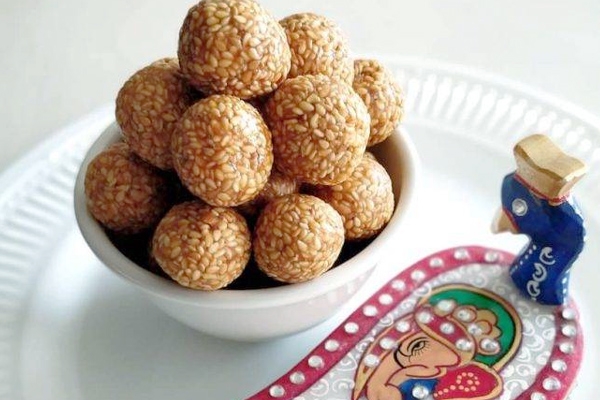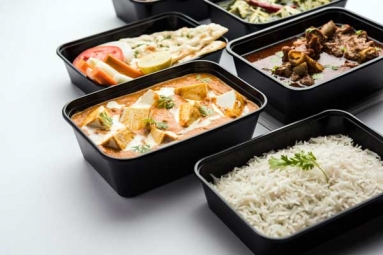
(Image source from: Latestly.com)
While offering tilgul during Makar Sankranti in Maharashtra, it is a tradition to say 'Tilgul ghya ani goad goad bola,' meaning "Have tilgul and say sweet things."
But actually, the humble tilgul can do more than just make you speak sweet. The customary sweetmeat prepared of jaggery and sesame seeds holds a special place of importance in Maharashtrian culture.
During Makar Sankranti, married women are invited for Haldi-Kumkum where it is a custom to adorn their foreheads with turmeric and vermillion. After that tilgul laddus are offered to the women, along with gifts such as utensils and clothes.
The sweetmeat is an illustrative representation of our ego - kind as sesame seeds yet sweet as jaggery. But aside from the spiritual significance, tilgul likewise has numerous health benefits.
Tilgul sweets are prepared by adding roasted sesame seeds and coarsely-chopped peanuts to molten jaggery. The pliable mixture is then molded into desired shapes. The outcome is a pleasant-tasting sweetmeat that has the salty sweetness of the jaggery and the nuttiness of the nuts and seeds.
Below are the health benefits of tilgul:
Cancer Protection
Sesamin in sesame seeds contains anti-cancer properties and is known as pro-apoptotic (promotes the destruction of cancer cells), an anti-proliferative (prevents spread of cancer), pro-angiogenic (promotes the formation of new blood vessels) and anti-inflammatory.
Phyto-estrogens in sesame also have a healthful effect against various cancers such as breast cancer.
Rich Source of Antioxidants
The sesame seeds in the tilgul contain rich reserves of antioxidants, which helps cut down oxidative stress.
The seeds are one of the great sources of a nutrient known as lignans, which help the body keep away from free-radical damage.
Cardiovascular Health
The lignans in the sesame seeds prevent degenerative diseases such as atherosclerosis and cardiovascular diseases.
Diet expert Rujuta Diwekar recommends tilgul for heart health since it contains indispensable fatty acids.
"Til and jaggery contain unsaturated fat which helps in lowering cholesterol levels," says dietician Priya Maisa from Complete Nutrition, Vashi.
Anti-Aging
Sesame seeds are best-known for their anti-aging properties due to its rich antioxidant reserves.
The antioxidants inside sesame seeds reduce oxidative stress and inflammation. It slows down the aging process by fighting degeneration of the cells.
Perfect for Winters
Makar Sankranti falls in January concurrently when India experiences winters and sesame is considered a heat-causing food, which keeps you snug when the mercury levels go down.
Bone Health
Eating the til and jaggery rich tilgul supplies your body with calcium, phosphorus and other important minerals. "These nutrients are good for improving bone health, especially during the winters," says Priya.
Hair Health
Scores of people undergo accelerated hair fall in winters and according to Rujuta, the phytonutrients in sesame helps reduce hair fall and prevents dandruff.
Anaemia Prevention
In some Indian families, mothers give their children a piece of jaggery if they believe they are getting excessively pale and there is a reason for this.
Jaggery is an exceptional source of iron and can be given to people who are anemic.
Energy Source
Eating tilgul laddus is an extraordinary way to refill energy when you feel inactive.
"Since jaggery contains sucrose, glucose, and fructose, tilgul gives you a burst of energy during the lazy winter months," adds Priya.
Briefly, tilgul is a great source of food to have during the winter months. In addition to its nutty taste, it has so much more to offer. But since it is a sweet treat, people with diabetes should be on the alert of going overboard.
-Sowmya Sangam












